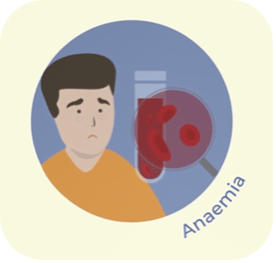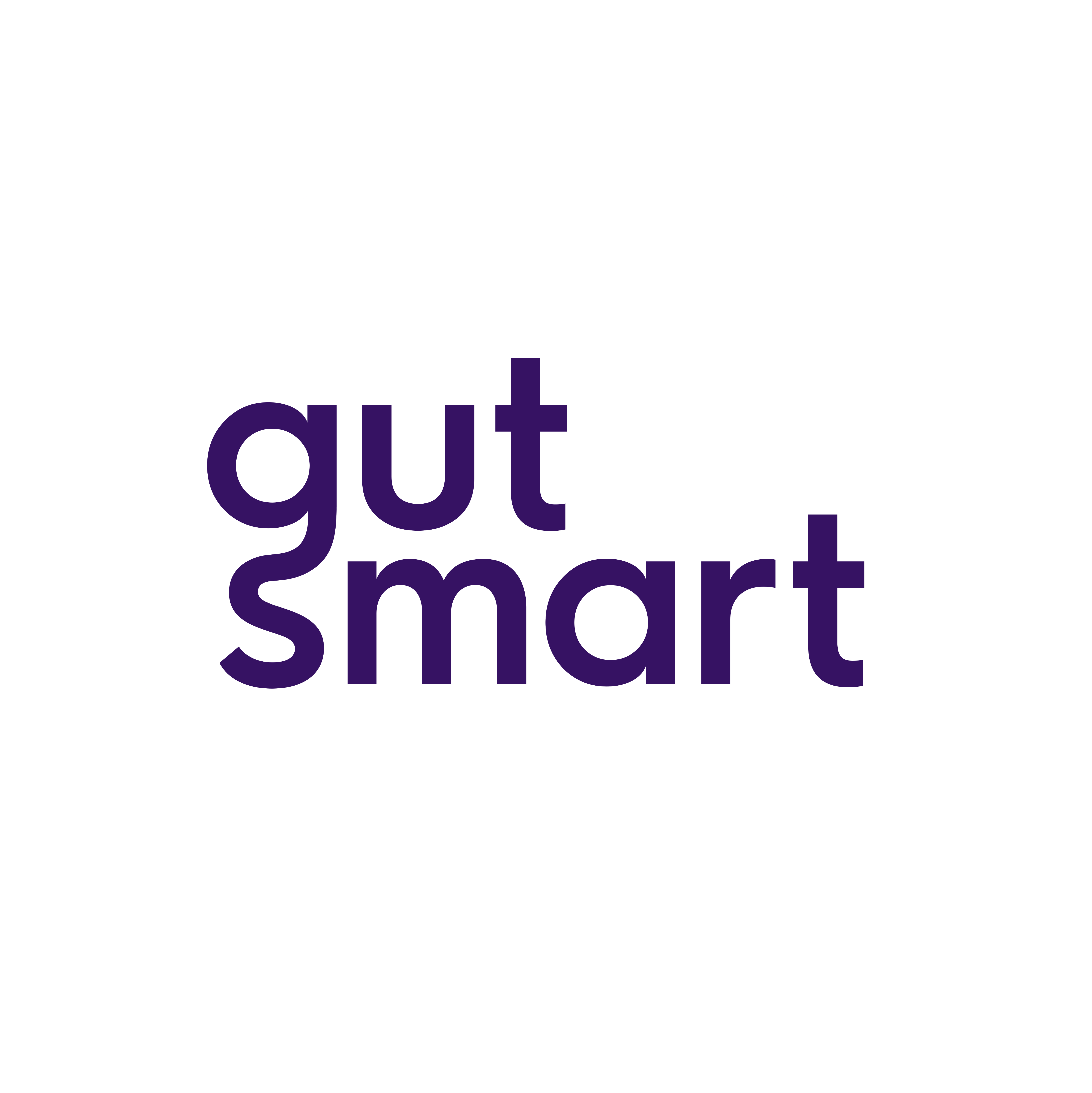Anaemia in IBD
Key points
- Anaemia is common in people with IBD.
- Anaemia means you don’t have enough health red blood cells to carry oxygen around your body.
- Common causes in IBD include losing blood, having chronic disease, and poor absorption or not eating enough iron, vitamin B12 and folate.

This dietary resource developed by DECCAN provides general dietary information on anaemia in Inflammatory Bowel Disease (IBD).
If you have Crohn’s disease or ulcerative colitis, your risk of developing anaemia is increased. Anaemia develops when the level of red blood cells in your blood are too low or not working properly.
Common types of anaemia experienced by people with IBD

- Low levels of red blood cells
- Iron-deficiency anaemia
- Vitamin B12-deficiency anaemia
- Folic acid-deficiency anaemia
Why are iron, vitamin B12 and folate important?
Iron helps to create red blood cells that carries oxygen around
your body, folate helps make new red blood cells, and vitamin B12 helps to keep your blood and nerve cells healthy. Almost half of people with IBD have iron deficiency anaemia.
Common causes of anaemia in people with IBD
- Chronic Inflammation
- Blood loss from ulcerated and inflamed bowel
- Decreased absorption of iron, vitamin B12 and folate in the gut caused byinflammation
- Surgery at the end of your small bowel (terminal ileum) where vitamin B12 is absorbed
- Not eating enough foods rich in iron, folate or vitamin B12 (see section below)
- Certain prescribed medications can decrease the absorption of iron and B12, andchange the metabolism of folate
Signs and symptoms of anaemia

- Tiredness and fatigue
- Dizziness or headaches
- Pale skin
- Shortness of breath
- Irritability and poor concentration
How is anaemia managed in people with IBD?
Anaemia should always be managed by your doctor or gastroenterologist. It is important for your doctor to first review whether your anaemia is being caused by your IBD and to review all your medications.
If your iron is low, your doctor may recommend an oral or intravenous iron to help correct your levels. It is important to discuss the most suitable form of iron replacement with your doctor as oral iron supplements can cause abdominal pain, constipation and darker stools.
If your vitamin B12 is low, your doctor may recommend intramuscular injection of vitamin B12. B12 sprays and oral tablets are not always effective.
Folate deficiency is common if you are taking sulfasalazine and methotrexate medication. An oral folic acid supplement is usually required and will be prescribed by your doctor.
Can dietary strategies help with anaemia?
Your doctor may also suggest you speak to a Dietitian to ensure you are eating enough iron, vitamin B12 and folate. A Dietitian can assess your current diet and advise you on how to include more iron, vitamin B12-rich and folate rich foods in your diet. A Dietitian can also advise on which foods can interfere with iron absorption.
How much iron, vitamin B12 and folate do I need?

The amount of iron, vitamin B12 and folate your body needs depends on your age, gender and whether there is frequent blood loss. In general, women of reproductive age who menstruate typically require more iron (up to twice as much) than women who do not regularly menstruate. A Dietitian can advise on your individual iron, vitamin B12 and folate requirements.
Folate
Folate is present in fruits and vegetables, legumes, wholegrains and fortified cereals.
Iron
Iron naturally occurs in animal and plant-based foods. Iron-rich foods include from animal sources (red meats, chicken, eggs, sardines) and plant-based sources (lentils, legumes, wholegrains, tofu, green leafy vegetables). Animal sources contain haem-iron which is more efficiently absorbed than plant-based sources of iron (non-haem iron).
| Iron rich foods | Serving size |
|---|---|
| High iron foods | |
| Kangaroo fillet or mince | 100g |
| Beef steak | 125g |
| Lamb, lean | 150g |
| Green lentils | 1 cup |
| Kidney beans, canned | 1 cup |
| Weetbix | 30g |
| Medium iron foods | |
| Sardines, tinned | 110g |
| Tuna, tinned | 180g |
| Eggs | 2 medium |
| Chickpeas, canned | 2/3 cup |
| Wholemeal pasta, cooked | 3/4 cup |
| Tofu | 100g |
| Raw spinach | 1 1/2 cups |
| Quinoa, cooked | 1 cup |
| Rolled oats | 60g |
| Peanut paste/ tahini | 40g |
What affects iron absorption?
Vitamin C (from fruit and vegetables) can help non-haem iron to be more efficiently absorbed. Some foods and drinks such as caffeinated beverages (tea, coffee, cola, energy drinks), wine and dairy products can reduce the efficiency of absorbing non-haem iron.
Dietary tips for increasing iron absorption
- Add fruit or fruit juice to a breakfast-style meal (rich in vitamin C)
- Add dark green leafy veggies to your meals or smoothies
- Avoid large amounts of dairy at main meals (e.g. glasses/mugs of milk)
- Have coffee / tea / wine between meals
Vitamin B12
Vitamin B12 naturally occurs in animal-based foods. Vitamin B12-rich foods include those with haem-iron (red meat, chicken, seafood, eggs) as well as milk and dairy products. Vitamin B12 does not naturally occur in plant-based foods except yeast-extracts (brewers yeast, vegemite). For this reason, people who do not eat animal products are likely to require an oral B12 supplement.
If you have inflammation or have had surgery to remove the last part of the small bowel (terminal ileum) where vitamin B12 is absorbed may require regular vitamin B12 intramuscular injections. Your doctor can advise on this and monitor your vitamin B12 levels.
Tips to include more iron and B12-rich foods:
| Breakfast | Lunch | Dinner | Snacks |
|---|---|---|---|
| 1. Add nuts and berries to breakfast cereals 2. Include a glass of juice 3. Use toast toppers like nut butters, eggs, spinach 4. Scrambled eggs or omelette 5. Cereals with added iron | 1. Add lean roasted meats, chicken, eggs, sardines, or falafel to sandwiches or wraps 2. Add lentils, beans and legumes to soups or salad 3. Include a piece of fruit after lunch 4. Add meats, beans, fish, eggs to hot meals | 1. Add lentils, chickpeas, kidney beans to curries, stews, casseroles 2. Add nuts (if tolerated), tofu, meats, eggs to stir frys 3. Add nuts and seeds to salads 4. Include a source of iron-rich foods with main meals | 1. Hommus with crackers or veggie sticks 2. Handful of dried fruits, nuts, seeds 3. Mini meatballs 4. Boiled eggs 5. Roasted chickpeas 6. Yoghurt |
An IBD dietitian can make personalised dietary recommendations if certain iron and B12- rich foods are not well tolerated.
Acknowledgements:
This resource was developed in 2022 by the DECCAN Education materials working group that included the following Accredited Practicing Dietitians: Alice Day, Jessica Fitzpatrick, Emma Halmos, Katherine Healy, Liz Purcell, Emily Hunt, Rumbidzai Mutsekwa, Nadia Shadid, Clara Newsome, Sarah Phillips, Emma Landorf. Requests and enquires about this document should be directed to [email protected] or website www.deccanibd.org. DECCAN does not take any liability for any injury, loss or damage incurred by the use or reliance on this information.
Developed December 2022. Date for review December 2024.
